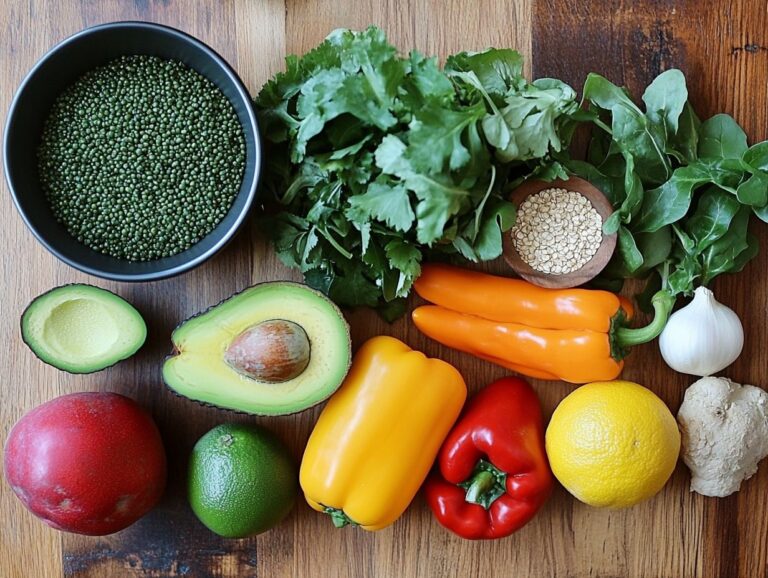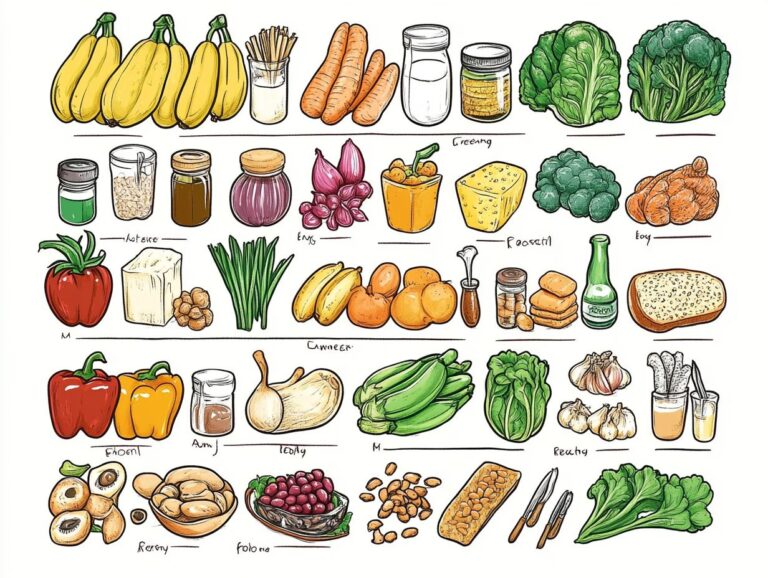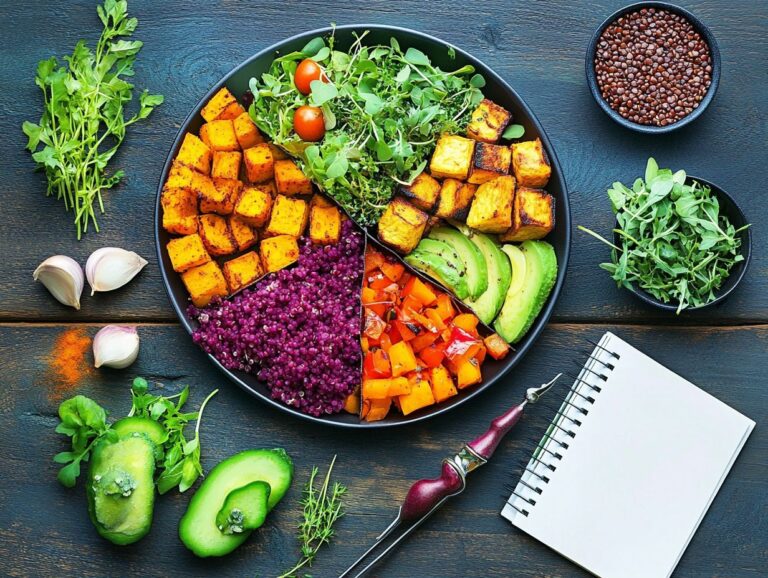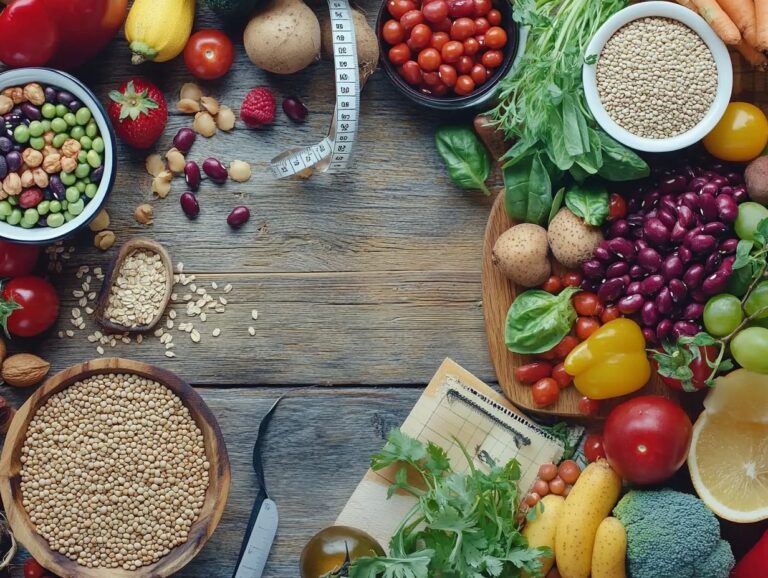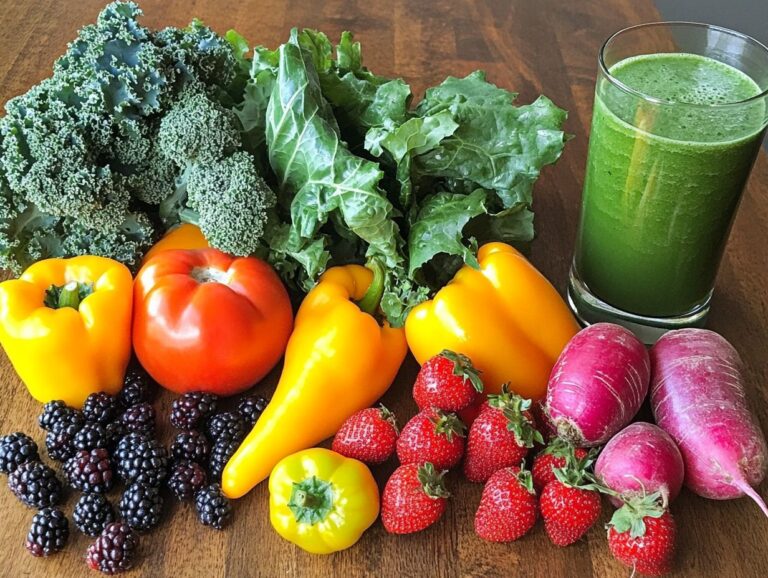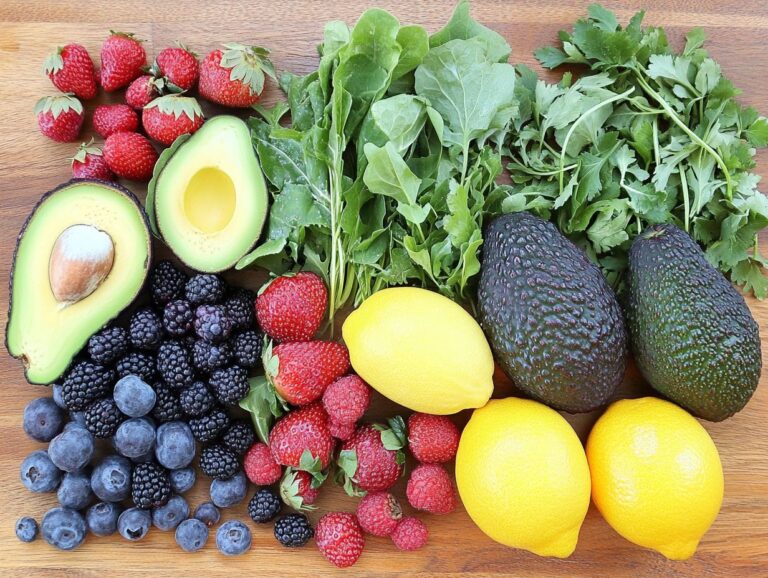If you’re looking to enjoy the benefits of a vegan lifestyle while incorporating the advantages of a low-carb diet, a low-carb vegan diet plan may be the perfect fit for you. This type of diet reduces carbohydrate intake and prioritizes plant-based foods. In this article, we will explore the benefits and challenges of a low-carb vegan diet plan, offer guidance on creating a balanced low-carb vegan meal plan, and share delicious low-carb vegan recipes for breakfast, lunch, dinner, snacks, and desserts. Whether your goals include weight loss, improved health, or simply embarking on a new culinary adventure, this guide will support you on your low-carb vegan journey.
Key Takeaways:
- A low-carb vegan diet can provide numerous health benefits such as weight loss, improved blood sugar control, and reduced risk of chronic diseases.
- To successfully follow a low-carb vegan diet, it is important to choose nutrient-dense plant-based foods and properly calculate macros to ensure adequate nutrition.
- Meal prep tips and being prepared for social situations can help you stay on track with your low-carb vegan diet plan, but be aware of potential health risks such as nutrient deficiencies and eating disorders.
What is a Low-Carb Vegan Diet Plan?
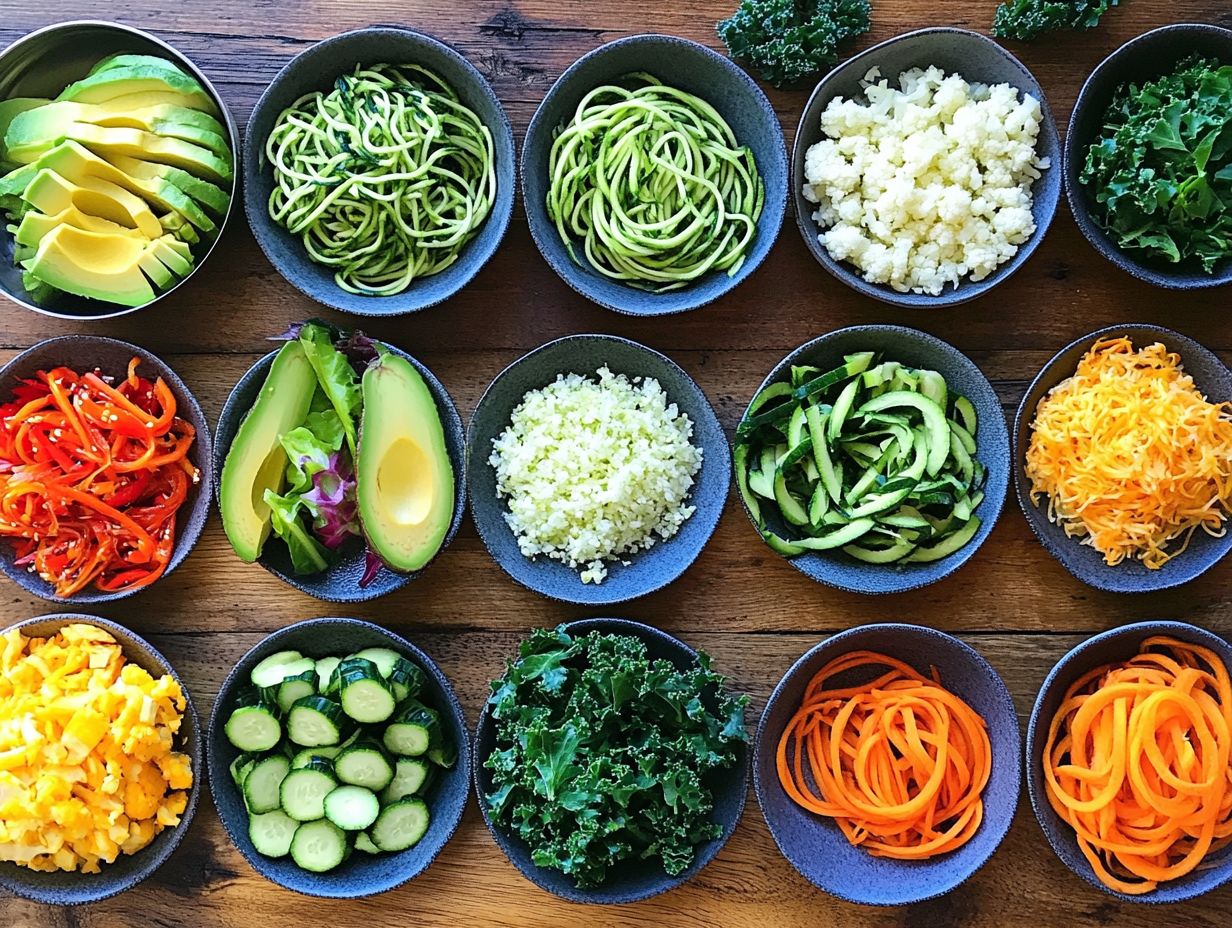
A Low-Carb Vegan Diet Plan is a dietary approach that merges the principles of a vegan diet with the low-carb philosophy, emphasizing plant-based foods that are low in carbohydrates while ensuring all nutritional needs are met. Created by a registered dietitian, this plan includes important nutrients for overall well-being.
This plan prioritizes healthy fats and proteins from sources such as tofu, tempeh, nuts, and avocados, while minimizing high-carb foods like grains and sugary fruits. Nutritional yeast can be added to enhance flavor and nutrient density.
By adhering to this diet, individuals can achieve their weight loss goals while enjoying a diverse array of delicious meals that are rich in essential nutrients, prepared with the expertise of a plant-based chef.
Why Choose a Low-Carb Vegan Diet Plan?
The benefits of a low-carb vegan diet plan include enhancing overall health, aiding in weight-loss goals, and promoting a plant-based lifestyle.
This diet supports weight management by emphasizing the intake of essential nutrients, ensuring that nutritional needs are met despite lower carbohydrate consumption. Additionally, it encourages the consumption of whole, unprocessed foods, which can contribute to improved general health.
What Are the Benefits of a Low-Carb Vegan Diet?
The benefits of a low-carb vegan diet are numerous, including effective weight loss, increased energy, and improved overall health.
By reducing carbohydrate intake, individuals may experience a decrease in cravings and an enhanced ability for the body to utilize fat as fuel, leading to more sustainable weight loss. A well-planned low-carb vegan diet can ensure the inclusion of essential nutrients while promoting healthy digestion and metabolic function. Incorporating complex carbs like those found in certain high-protein vegan foods can support sustained energy levels.
This dietary approach encourages the development of meal plans that feature high-quality sources of protein and healthy fats, both of which are vital for maintaining energy levels throughout the day. By incorporating nutrient-dense foods such as legumes, nuts, seeds, and a variety of vegetables, individuals can improve their metabolic health while reaping the weight-loss benefits of a low-carb vegan lifestyle.
Additionally, reducing carbohydrate intake can lead to lower sugar consumption, promoting more stable blood sugar levels, which is essential for successful long-term weight loss.
Being mindful of portion sizes and balancing macronutrients in meal plans can further enhance the positive health benefits associated with adopting a low-carb vegan diet.
What Are the Challenges of Following a Low-Carb Vegan Diet?
A low-carb vegan diet can indeed be beneficial, but it also presents challenges that individuals may encounter. The primary challenge is ensuring that all nutritional needs are met, particularly regarding protein and important nutrients that are typically found in higher-carb food sources. This may require careful planning and potentially a consultation with a registered dietitian to create a diet that fulfills these requirements.
People often face nutrient deficiencies, especially in vitamins B12 and D, omega-3 fatty acids, and iron. To address these nutritional gaps, it is important to incorporate a diverse range of low-carb vegetables, legumes, nuts, and seeds into the diet.
Working with a dietitian to develop a professional meal plan can assist individuals with meal preparation and ensure their dietary choices meet their nutritional needs. Additionally, being diligent about reading food labels and considering fortified foods or supplements can help maintain overall health while following a low-carb vegan diet. Consulting resources such as EatingWell Editorial and publications like Delish Knowledge can provide additional insights into managing this dietary approach.
How to Create a Low-Carb Vegan Diet Plan?
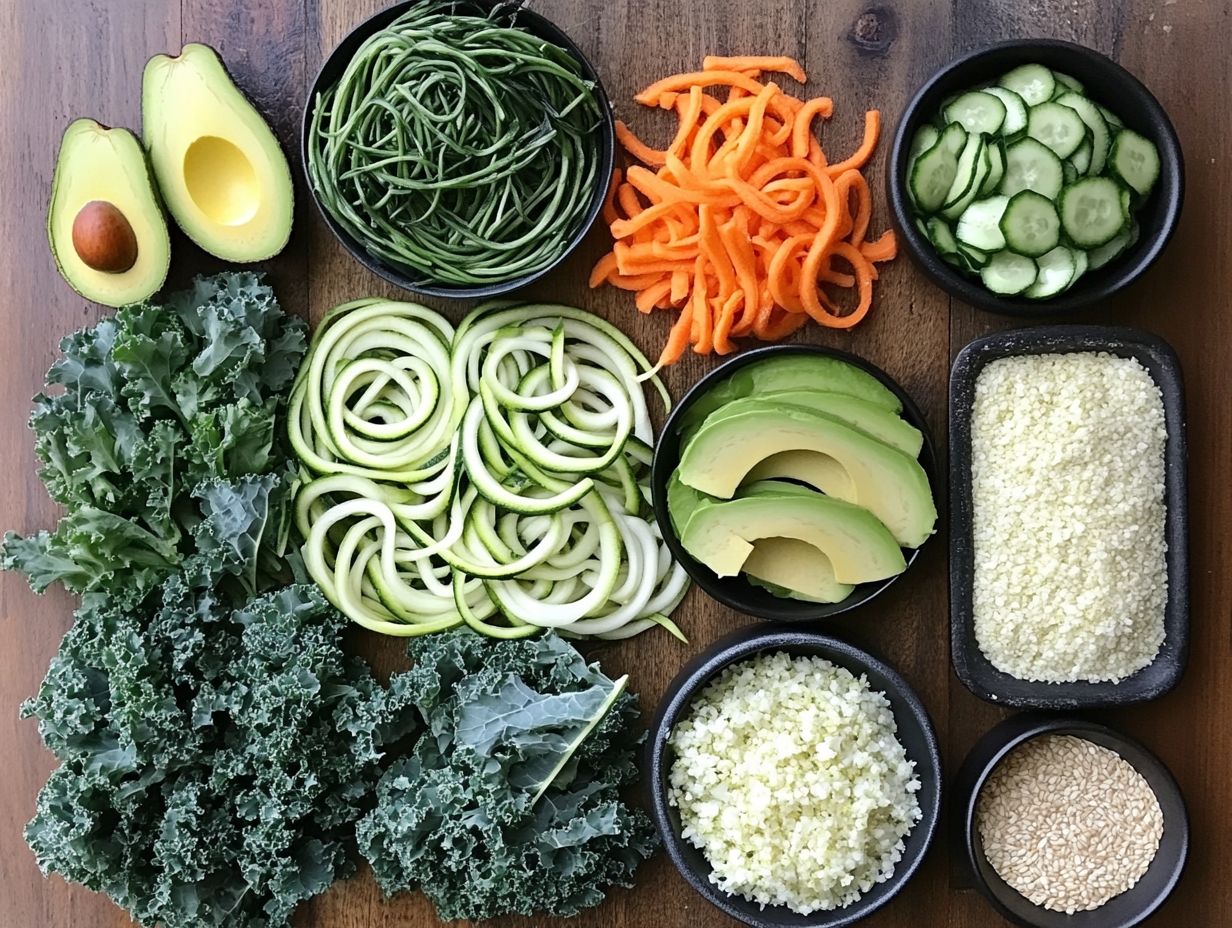
A Low-Carb Vegan Diet Plan is an effective approach to reducing carbohydrate intake while ensuring that all nutritional needs are met through healthy plant-based foods.
This diet plan, often structured as a meal plan created by a dietitian, helps individuals make informed low-carb food choices. It emphasizes the importance of obtaining protein, healthy fats, and fiber from vegetables, nuts, and seeds.
Additionally, tips on meal preparation are essential for successfully implementing this eating lifestyle.
What Are Some Low-Carb Vegan Foods?
Low-carb vegan foods are nutrient-dense options that offer a variety of health benefits. Tofu and edamame serve as protein-rich, low-carb staples in a vegan diet. Other low-carb vegetables, such as cabbage, broccoli, and avocados, contribute healthy fats and fiber.
Additionally, almonds and various berries can be combined to create satisfying low-carb snacks. Nutrient density refers to the amount of nutrients per calorie in food. Tofu is considered an excellent low-carb vegan food because it provides a substantial amount of plant-based protein, containing all essential amino acids.
Avocados rank among the most nutrient-dense low-carb vegan foods, as they are rich in monounsaturated fats and potassium, both of which support cardiovascular health. Broccoli is another nutrient-dense low-carb option; it offers both soluble and insoluble fiber, along with high levels of vitamin C, which enhances immune function, and vitamin K, which is vital for bone health.
Incorporating foods like jackfruit and tempeh can also diversify a low-carb vegan diet. With careful meal planning, these foods can help maintain low carbohydrate levels while delivering a wide range of essential nutrients to ensure adequate energy and a balanced diet.
How to Calculate Macros for a Low-Carb Vegan Diet?
Calculating macronutrients for a low-carb vegan diet is essential for ensuring that individuals meet their nutritional needs while effectively managing carbohydrate intake. This process involves determining the appropriate ratios of carbohydrates, proteins, and fats based on personal goals, such as weight loss and muscle maintenance. A dietitian can assist in creating a meal plan that focuses on maintaining adequate daily protein intake while minimizing carbohydrates without compromising overall health.
To accurately calculate macronutrients, one must first establish a baseline for total daily energy expenditure (TDEE), which takes into account factors like age, weight, height, and activity level. From this baseline, an individual can choose desired macronutrient ratios, often recommended as:
- 10-20% carbohydrates
- 30-35% proteins
- 45-60% fats
For effective tracking, many people find smartphone apps helpful, as these tools enable them to log their food intake and monitor progress against their meal plan. It is also vital to include plant-based protein sources such as lentils, chickpeas, and tofu to meet daily protein goals while adhering to a low-carb framework. Brands like Vega Sport and Sunwarrior offer plant-based supplements that can complement a low-carb vegan diet.
What to Eat on a Low-Carb Vegan Diet Plan?
Adhering to a low-carb vegan diet can be both enjoyable and nutritious with proper planning to ensure that meals are not only delicious but also meet an individual’s dietary needs. This diet can include options like tofu crumbles, salads with citrus vinaigrette, and other flavorful low-carb vegan dishes. Spicy Weight-Loss Cabbage Soup can also be a delightful choice.
The key is to focus on whole foods, low-carb vegetables, and high-protein sources, which help keep meals satisfying and nutritious. A typical low-carb vegan diet plan consists of various meals, including breakfasts, lunches, snacks, and dinners.
Below are examples of meals that individuals can enjoy throughout the day.
Low-Carb Vegan Breakfast Ideas
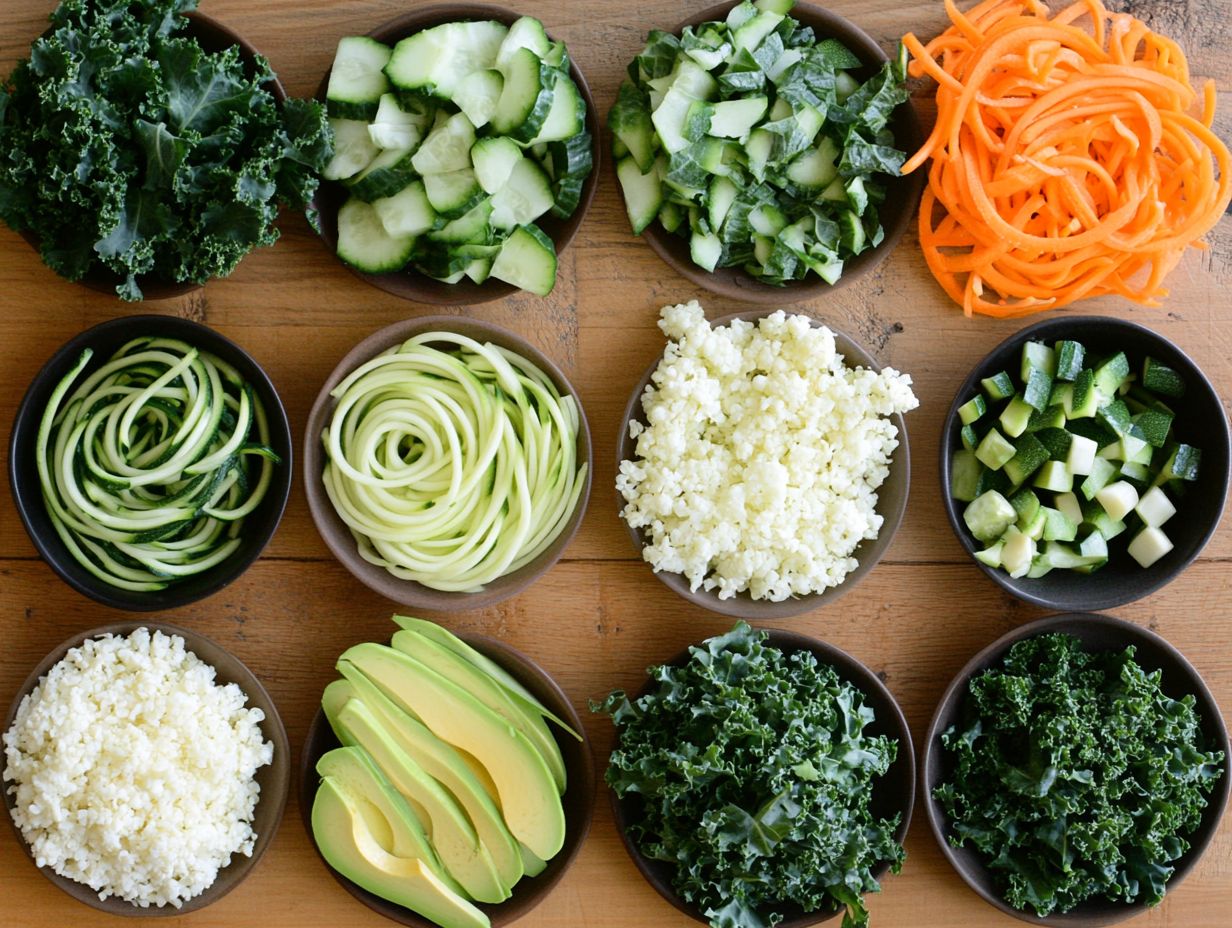
Low-carb vegan breakfast ideas can help maintain a balanced diet while accommodating dietary restrictions.
For a protein-packed start to the day, consider scrambled tofu mixed with sautéed broccoli. A smoothie made with spinach and berries offers essential vitamins and minerals without excessive carbohydrates. Enjoy a bowl of muesli made with low-carb ingredients for added variety.
For those seeking variety, chia seed pudding prepared with unsweetened almond milk and topped with a mix of nuts and seeds provides healthy fats and fiber.
Another quick option is avocado toast on low-carb bread, which adds a satisfying crunch.
Meal prepping can alleviate the morning rush; by preparing ingredients like chopped vegetables and tofu in advance, a nourishing meal can be ready in just minutes. By incorporating different greens and seasonal fruits, breakfast options can remain exciting and nutrient-rich, making the start of the day both delicious and healthful.
Low-Carb Vegan Lunch Ideas
Low-Carb Vegan Lunch Ideas are healthy and satisfying meals that align with dietary guidelines and are perfect for the midday meal.
- One option is an avocado and shredded cabbage salad, which is rich in healthy fats and fiber.
- Another choice is a quinoa bowl featuring mixed greens and roasted vegetables, allowing for low carbohydrate intake without sacrificing flavor. This can be enhanced with a Citrus Vinaigrette for added zest.
- Additionally, a vibrant Buddha bowl filled with an array of vegetables and protein-packed chickpeas makes for a nutritious meal. Including complex carbs like quinoa ensures a balanced dish.
- For those looking for an alternative to traditional pasta, spiralized zucchini noodles topped with a refreshing avocado dressing are an excellent choice.
These meal prep ideas not only save time during busy weekdays but also introduce variety and excitement to lunchtime. Roasted cauliflower steaks seasoned with aromatic spices provide a gourmet touch to low-carb vegan dishes.
Low-Carb Vegan Dinner Ideas by Plant-Based Chef Christa Brown
Low-Carb Vegan Dinner Ideas can be both filling and nutritious by focusing on ingredients that provide important nutrients while keeping carbohydrate levels low. Dishes such as stir-fried vegetables with tofu crumbles offer a high protein content, along with a variety of flavors and textures that stimulate the taste buds. Incorporating Tofu Crumbles enhances the flavor profile and adds to the daily protein required for maintenance.
For instance, leafy greens like spinach and kale are rich in important vitamins A, C, and K, which are vital for normal body functions. A warm quinoa and black bean salad with a light dressing supplies necessary fiber and promotes digestive health. This dish can be a part of a health weight-loss meal plan when crafted by a registered dietitian.
Roasted cauliflower steaks, seasoned with herbs, serve as a satisfying main dish that is low in carbohydrates yet high in antioxidants. Each meal can be easily adapted to feature seasonal vegetables, maximizing the nutrient profile and keeping diners engaged with varied and colorful offerings.
Low-Carb Vegan Snack Ideas
Low-carb vegan snack ideas are an excellent way to ensure that individuals on any diet have options available to maintain consistent energy levels throughout the day while adhering to their dietary restrictions. Low-carb snacks like roasted edamame and a handful of almonds offer a satisfying crunch and a good source of protein, while fresh berries add a touch of sweetness without the added carbohydrates. These snacks can be inspired by recipes from Alexandra Caspero Lenz and The Plant-Based Baby + Toddler.
Here are a few nutritious low-carb snack recipes to consider:
- Avocado Slices with Lemon: Simply cut an avocado in half, remove the pit, and drizzle fresh lemon juice over the flesh for a refreshing snack.
- Cucumber Boats with Hummus: Slice a cucumber in half and scoop out the seeds. Fill the cavity with hummus for a crunchy, low-carb treat.
Meal prepping can significantly enhance the convenience of these snacks. Preparing a mixed nut and seed combination can create an easy-to-grab trail mix. Additionally, incorporating vegetables such as bell peppers or radishes alongside nut butter can help curb cravings while providing essential vitamins.
Having these options readily available ensures that everyone can maintain healthy eating habits without much thought.
How to Stay on Track with a Low-Carb Vegan Diet Plan?
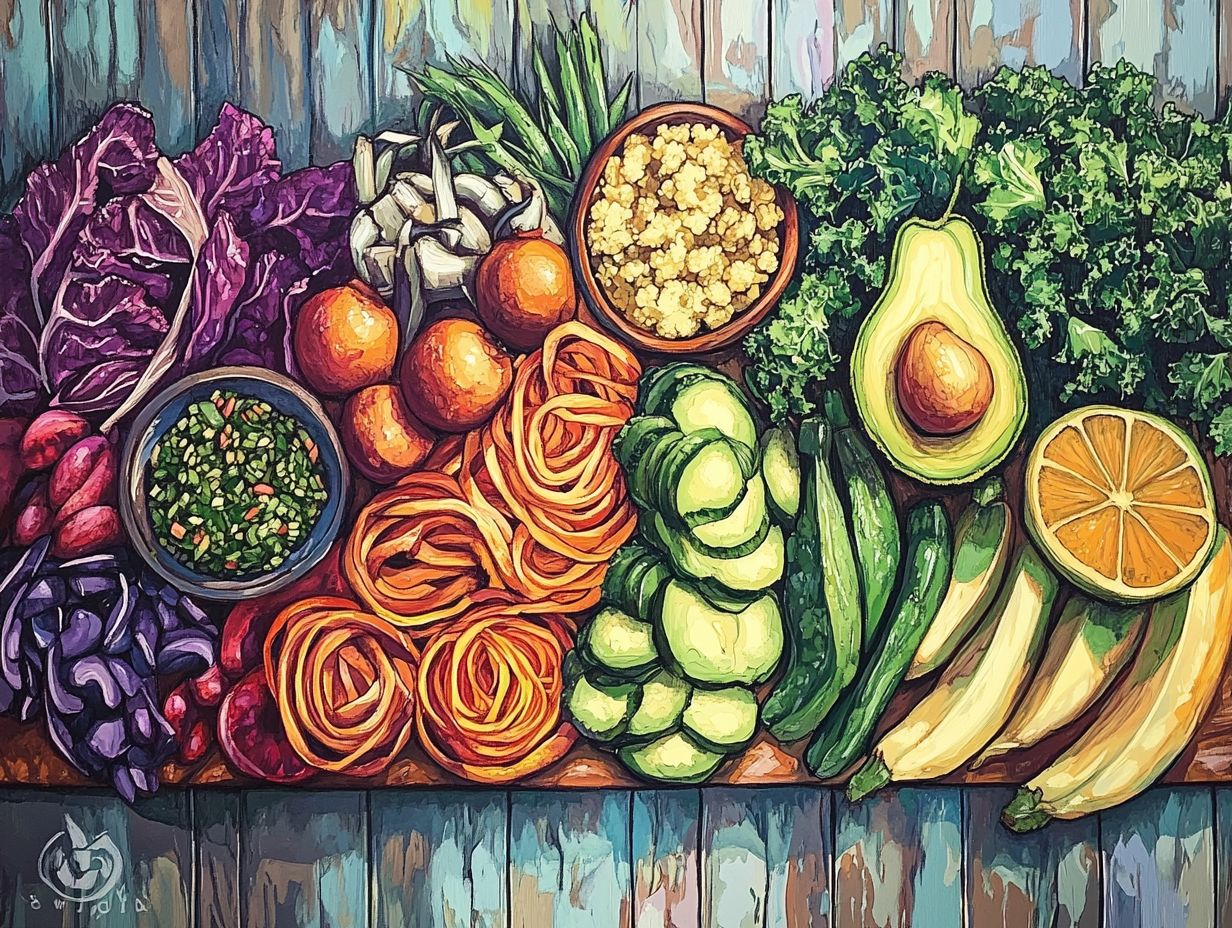
Staying committed to a Low-Carb Vegan Diet Plan requires effective meal preparation, careful planning for social events, and adherence to food safety practices to ensure long-term success.
Meal prep tips can help individuals simplify their dietary choices and resist temptations that may arise during social gatherings or outings.
Meal Prepping Tips
Meal prepping is a valuable strategy for adhering to a low-carb vegan diet, as it simplifies meal preparation and helps ensure consistent nutritional intake.
Effective meal prep tips for a low-carb vegan diet include:
- Batch cooking low-carb staples
- Pre-portioning snacks
- Using clear labels to maintain food safety and freshness throughout the week
Incorporating a variety of vegetables, such as cauliflower, zucchini, and leafy greens, can prevent meals from becoming monotonous while still adhering to dietary restrictions. It is also essential to plan meals that feature protein-rich options like tofu or tempeh, as these can support overall health and help maintain muscle mass.
Preparing dressings or dips with avocados or nuts can enhance flavor without compromising the low-carb aspect of the diet. For instance, a Citrus Vinaigrette can be a delightful addition. To further promote food safety, storing prepared meals in airtight containers and regularly checking expiration dates can help avoid spoilage and ensure that meals remain enjoyable throughout the week.
How to Handle Social Situations and Eating Out?
Navigating social situations and dining out on a low-carb vegan diet can be challenging, but it is possible to manage these situations effectively with careful planning and meal preparation strategies.
Communicating dietary preferences as soon as plans are made, along with researching menus in advance, helps ensure that low-carb vegan requirements and food safety are met while accommodating social settings.
Meal planning can assist in identifying restaurants that offer low-carb vegan options or in finding dining venues that are flexible enough to meet dietary specifications.
At social gatherings or events, bringing a small dish or snack that adheres to dietary restrictions can help alleviate anxiety about food choices. Additionally, being honest and open about dietary needs at social functions encourages others to support these decisions, ultimately enhancing social well-being.
Being mindful of portion sizes and ingredient choices allows individuals to enjoy their meals without compromising their health goals, making social and dining experiences more enjoyable.
Potential Health Risks of a Low-Carb Vegan Diet Plan
While a low-carb vegan diet may offer certain advantages, it also carries potential health risks that individuals should be aware of, including nutrient deficiencies, constipation, and an increased risk of eating disorders.
These risks typically arise in cases where the diet is poorly planned, underscoring the importance of a balanced approach that incorporates a diverse range of foods to fulfill all dietary needs.
Nutrient Deficiencies
Nutrient deficiencies are a significant drawback of low-carb vegan diets, as these diets can lack essential nutrients if not properly planned. The most common deficiencies include protein, iron, vitamin B12, and omega-3 fatty acids.
Therefore, it is recommended that individuals following this diet develop meal plans with the assistance of dietitians to help address these deficiencies. It is essential for those on this type of diet to take extra care in incorporating alternative sources of these nutrients.
- For example, protein needs can be met through legumes, nuts, and seeds.
- Iron can be adequately obtained from leafy greens and fortified plant-based products.
- Vitamin B12 is a crucial nutrient not naturally found in plant-based foods, so it should be supplemented through either dietary supplements or fortified foods, such as nutritional yeast and plant-based milks.
- Additionally, omega-3 fatty acids, which are primarily found in non-vegetarian foods, can be sufficiently sourced from flaxseeds and chia seeds added to the diet.
Constipation
Constipation is a common issue for individuals following a Low-Carb Vegan Diet, often resulting from reduced fiber intake due to fewer carbohydrate sources. This condition is a significant concern as it can impact overall health, making it essential to design a Low-Carb Vegan Diet that includes sufficient high-fiber vegetables, nuts, and seeds to meet nutritional needs and maintain digestive health.
Foods such as chia seeds, flaxseeds, and leafy greens should be included to ensure adequate fiber consumption. Additionally, inadequate fluid intake can contribute to constipation; therefore, prioritizing hydration is crucial, as water facilitates digestion and helps prevent the hardening of stools.
Incorporating fermented foods like sauerkraut and kimchi can also support a healthy gut microbiome by providing beneficial probiotics. Additionally, exploring options from companies like Vega Sport or 22 Days Nutrition could provide innovative solutions. By achieving the right balance of key nutrients on a low-carb diet, you can promote both satisfaction and health while effectively addressing constipation.
Increased Risk of Eating Disorders
A strict low-carb vegan diet can increase the risk of developing eating disorders, as individuals may become overly vigilant about their food restrictions. This heightened focus can lead to unhealthy relationships with food, making it essential to create balanced meal plans that emphasize healthy eating habits alongside mental well-being.
When the emphasis is solely on avoiding carbohydrates, individuals may experience feelings of guilt or shame if they consume something outside their dietary guidelines. To mitigate these risks, a mindful approach to eating should be implemented.
Incorporating a wide variety of nutrient-rich ingredients and allowing for some flexibility in the diet can promote enjoyment. Additionally, participating in social eating occasions and focusing on other aspects of a healthy lifestyle, rather than just the numbers, can foster a more positive relationship with food.
Ultimately, cultivating a kind relationship with food will support long-term dietary adherence without compromising mental health.
